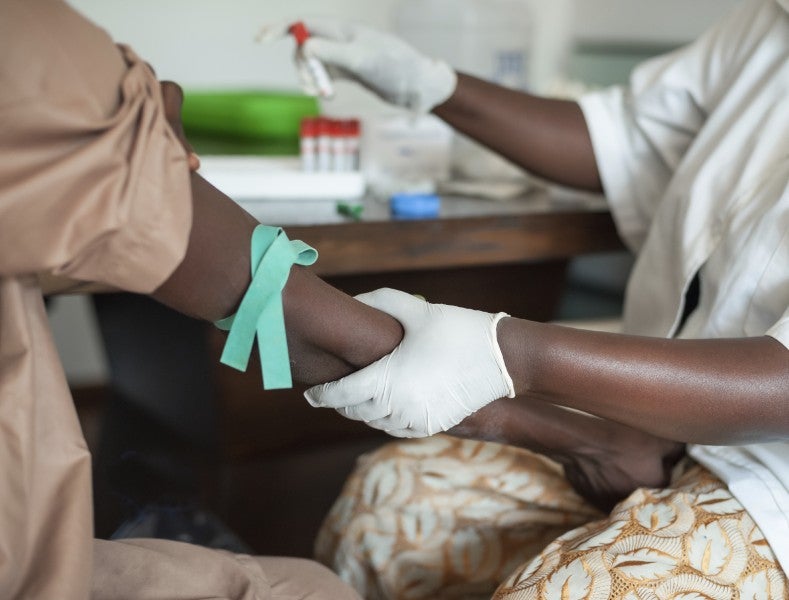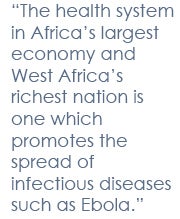
The hospital discharge of American Dr. Kent Brantly, a recovering Ebola patient, illustrates that tackling the outbreak requires more than medication. Brantly was transported from Liberia once he was diagnosed with Ebola and flown to the US. He was treated with an experimental drug — even as a colleague was being buried on the other side of the globe. Why would the drug work in America but not in Africa? As a physician from West Africa, I am all too familiar with the conditions that make this possible. They are some of the key reasons why the current outbreak of Ebola has been so difficult to manage.
We are currently facing the worst outbreak of Ebola in recorded history. According to the World Health Organization (WHO), there have now been 2,615 cases of Ebola, and 1,427 deaths, and new cases are still being identified five months after the epidemic broke out in Guinea. Indeed the global health agency recently admitted that these figures are likely underestimated.
I worked as a physician in Nigeria for six years. Before that I spent seven years in medical school with rotations in several hospitals, all within Nigeria. In all those years, I experienced first-hand the true nature of the health system in the world’s most populous black nation. Sadly, the health system in Africa’s largest economy and West Africa’s richest nation is one which promotes the spread of infectious diseases such as Ebola. If this is the case in Nigeria, it is hard to imagine that that there could be better conditions in the poorer nations of West Africa.

Ebola is spread when people come in direct contact with blood or secretions from an infected person. This means that the spread of Ebola can only be prevented by careful hygiene, sanitation, and the avoidance of contact with bodily fluids of an infected patient. But hygiene and sanitation are only possible where clean water is freely available. This is not the case in Nigeria. In my experience, most municipalities in Nigeria lack a central water supply system, and as such, every household or hospital has to provide its own water by digging a bore hole into a subterranean aquifer. The water is passed through a purification system — where there is one — and then piped into the buildings as desired.
In the 250-bed hospital where I worked, as in most Nigerian hospitals, the water was piped almost only into the restrooms. Most patients were cared for in open wards housing up to 20 beds with only one sink at one end of the ward. The few who could afford it received care in private rooms that had no sinks except in the restroom. To make matters worse, water was often not available because of frequent electric power cuts and poor maintenance of the power generators that were required to pump up the water.
But even if we had electricity, water, and sanitation taken care of, there would still be the problem of effective barrier nursing. According to the Centers for Disease Prevention and Control (CDC), the barrier nursing techniques required to control the spread of Ebola include wearing protective clothing (such as masks, gloves, gowns, and goggles), using infection-control measures (such as complete equipment sterilization and routine use of disinfectant) and isolating patients with Ebola from contact with unprotected persons. But, as a Nigerian epidemiologist puts it, the use of personal protective equipment (PPE) is a rarity in Nigeria. This probably explains why most of those infected with Ebola in Nigeria are health care workers. Because of the poor funding for the Nigerian health system, emergency preparedness with stockpiling of PPE was never given priority. Even priority items such as disinfectants are hardly ever available in sufficient quantity.
In many Nigerian hospitals, the isolation of patients with contagious diseases such as Ebola is conducted in a laughable manner. But this is no occasion for laughter. I have seen hundreds of contagious patients ‘isolated’ with a cloth screen. Those patients are placed at the end of the ward, farthest from the nursing station, and screens are placed around their beds. If their infections were transmitted by air, as Ebola might be, not much is achieved by this isolation method. Special isolation rooms with controlled air flow, found in most US hospitals, are not commonplace in Nigeria.
It is likely that the intensive care Brantly received at Emory University Hospital played a major role in his survival. Certain basic interventions, when used early, can increase the chances of survival for Ebola patients. These include providing intravenous fluids and balancing electrolytes (body salts), maintaining oxygen status, and blood pressure, and treating other infections if they occur. In the intensive care units of most Nigerian hospitals — and likely in Liberia — the gadgetry for properly monitoring a patient’s blood pressure, as well as oxygen, fluid, and electrolyte status are nonexistent. Indeed, oxygen and the drugs needed to maintain an adequate blood pressure are often unavailable. When patients need a blood transfusion, the experience is usually a harrowing one. Our blood banking systems are still rudimentary.
I appreciate the efforts of the Nigerian government to stem the spread of Ebola in our country and I acknowledge the efforts of the other West African governments. But I am afraid that we might be doing too little too late. When we get through this Ebola outbreak we will still be faced with many issues if our health system is not fixed now. I advocate a top-down approach to the problems of the Nigerian health system. We need to see the actionable political will required to implement policies that favor the provision of steady electricity and potable water to all Nigerians. We need investments in the public health sector to ensure the proper equipment of our hospitals and clinics. We need funding for research into the treatment and prevention of diseases such as Ebola that the West considers “African.” Unless we fix our political system, our health system will remain unable to cope with the challenges of emerging infectious diseases.
Dr. Utibe Effiong is a research scientist at the University of Michigan School of Public Health. He is also a New Voices Fellow at the Aspen Institute.

